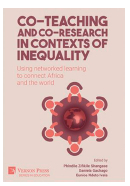Serviços Personalizados
Artigo
Indicadores
Links relacionados
-
 Citado por Google
Citado por Google -
 Similares em Google
Similares em Google
Compartilhar
South African Journal of Science
versão On-line ISSN 1996-7489
versão impressa ISSN 0038-2353
S. Afr. j. sci. vol.120 no.3-4 Pretoria Mar./Abr. 2024
http://dx.doi.org/10.17159/sajs.2024/17840
BOOK REVIEW
From casting to recasting: Reviewing the Recasting of Workers' Power
Mondli Hlatshwayo
Centre for Education Rights and Transformation, University of Johannesburg, Johannesburg, South Africa. Email: mshlatshwayo@uj.ac.za

Book Title: Recasting workers' power: Work and inequality in the shadow oi the Digital Age
Authors: Edward Webster, Lynford Dor Kally Forrest, Fikile Masikane, Carmen Ludwig
ISBN: 9781776148820 (paperback 208 pp)
Publisher: Wits University Press. Johannesburg: ZAR300
Published: 2023
In 1985, Eddie Webster's book entitled Cast in a Racial Mould: Labour Process and Trade Unionism in the Foundries1 was published by Ravan Press. Among many other things, the book discusses how iron and steel moulds of the East Rand near Johannesburg cast or divided workers according to their skin colour, where white workers and their unions had to struggle over many years to defend and advance their privileges at the workplace. On the other hand, the book, which became one of the critical knowledge foundations of Labour Studies in South Africa and the world over, demonstrates how black workers in South Africa's metal sector were able to cast their net wide by building a trade union called the Metal and Allied Workers Union (MAWU), which became the shield and spear of black metal workers.
Webster and his team's most recent book, Recasting Workers' Power: Work and Inequality in the Shadow of the Digital Age, reveals how work and the labour processes have changed since the 1990s (p. ix-xiv). The recent book analyses and discusses an entirely different world of work from that in the 1980s. The resistance workers 'cast in a racial mould' were the black industrial proletariat, who were often regarded as blue-collar workers who were the core of the workforce that confronted what von Holdt2 characterised as the "apartheid workplace regime". The militant layer's political and organisational leverage waned as the manufacturing sector declined in the 1990s.
In some ways, the "recasting of workers' power" is about the second phase of workers' power since the 1970s and the 1980s. A new social force is being born to replace the old one. The changing nature of work, the deepening oppression of workers, and the weaknesses of trade unions are recasting or reshaping an extremely precarious workforce working in the informal economy, digital spaces, and factories. Despite being weakened by capital, these workers are finding ways to recast their power to resist extreme forms of subjugation in labour.
Like in Cast in a Racial Mould, Webster and his team adopt dualism to unpack workers' oppression and resistance in South Africa, Uganda, Kenya, and other countries. The observations, in-depth interviews, and documentary analysis are deployed to reveal the duality of oppression and resistance in the labour processes. In other words, this ethnographic approach enabled Webster and his team to show new organisational forms emerging in the formal and informal economies of the Global South, disputing the perspective that neoliberal globalisation has ultimately defeated the workers of the Global South. Of course, Webster and his team understand that the workers of the Global South are engaged in what I describe as an asymmetrical warfare persecuted by the states, businesses, and the powerful forces of the Global North.
However, workers discussed in the recent book have various forms of power in this asymmetrical warfare. To this end, this new book examines organising strategies through the prisms of three other forms of power: coalitions (the power of society), associational power (the power of collective organisation), and institutional power (the laws that uphold labour rights).
The book also makes the case that labour is still relevant by deploying various sources and forms of worker power. Webster and his colleagues assert that precarious workers, including digital workers, are redefining their resistance to the growth of precarious forms of labour. The book acknowledges that workers and trade unions have been undermined by capitalists. Trade union density, or the rate at which employees join unions, has decreased both globally and in South Africa, which is one indication of this reality.
Webster rejects the "end of labor thesis" (p. ix) and demonstrates that even the most alienated platform workers possess the capacity for individual and collective resistance against complete subjugation by capitalist and platform systems. Webster and Dor's work (Chapter 4) transcends mere analysis of the issues of digital oppression and offers a sense of hope for labour, particularly within the context of the Global South. Despite all the challenges confronting platform workers in South Africa and the Global South, this is true. Masikane also shows that, notwithstanding the formidable algorithms in place, the collective strength of smartphone-based platforms thwarted the operations of Uber Eats in December 2020 (p. 101-124). This resistance compelled platform employees to impose a fixed fee of EURO.50 for each delivered meal.
As a scholar and activist who witnessed the rise and decline of manufacturing workers and their trade unions, Webster has not given up hope on labour, despite its changes in shape and form. As he was with the workers who led the Durban strikes of 1973, he is now with the platform economy workers, informal workers, and precarious workers searching for an organisational response in this asymmetrical war against this new form of vampire capitalism.
References
1. Webster E. Cast in a racial mould: Labour process and trade unionism in the foundries. Johannesburg: Ravan Press; 1985. [ Links ]
2. Von Holdt K. Social movement unionism: The case of South Africa. Work Employ Soc. 2002;16(2):283-304. https://doi.org/10.1177/095001702400426848 [ Links ]
Published: 27 March 2024














